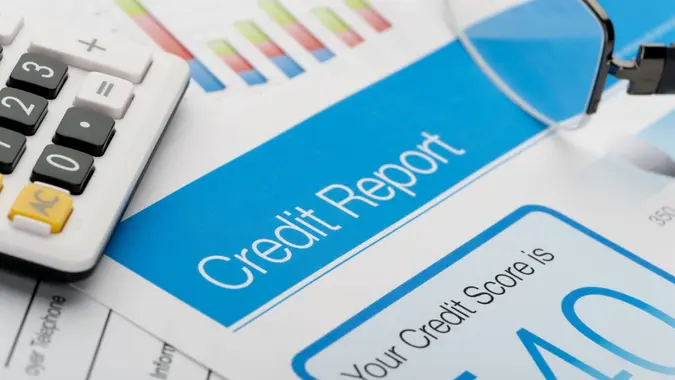What Credit Score Do You Need To Buy a Car?

Commitment to Our Readers
GOBankingRates' editorial team is committed to bringing you unbiased reviews and information. We use data-driven methodologies to evaluate financial products and services - our reviews and ratings are not influenced by advertisers. You can read more about our editorial guidelines and our products and services review methodology.

20 Years
Helping You Live Richer

Reviewed
by Experts

Trusted by
Millions of Readers
Purchasing a car is a significant financial decision, and your credit score plays a pivotal role in this process. Understanding the credit score for a car loan is essential for anyone looking to buy a vehicle. Read on to learn what credit score is needed to buy a car and how it can impact the terms of your loan.
What Credit Score Do You Need To Buy a Car?
There isn’t a universal minimum credit score required to buy a car, as it can vary by lender. However, a higher score generally means better loan terms. Scores are typically categorized as follows:
- Excellent — 740 and above: Qualify for the lowest interest rates and best terms.
- Good — 670 to 739: Likely to receive competitive rates, though slightly higher than those with excellent scores.
- Fair — 580 to 669: May qualify for a loan, but with higher interest rates.
- Poor — below 579: Might face challenges in getting approved. If approved, interest rates will be significantly higher.
Factors Affecting Your Credit Score
Your credit score is influenced by several key components, each playing a crucial role in determining your financial health. Understanding these factors is essential, especially when preparing for a significant purchase like a car.
- Payment history: Consistently paying bills on time is the key to a good credit score.
- Credit utilization ratio: Aim to use less than 30% of your available credit to keep this ratio healthy.
- Length of credit history: A longer credit history can contribute positively to your score.
- Types of credit in use: Having a mix of credit types, like credit cards and loans, can benefit your score.
- Recent credit inquiries: Too many hard inquiries in a short period can negatively impact your score.
Improving Your Credit Score for a Car Loan
Enhancing your credit score is important for securing favorable loan terms for your car purchase. Here are some strategies to boost your score.
Timely Bill Payments
Consistently paying your bills on time can improve your credit score. Payment history is a significant component of your credit score calculation, reflecting your financial responsibility to potential lenders. Setting up reminders or automated payments can ensure you never miss a due date.
Lowering Debt
Reducing your existing debt, particularly high-interest debt, can positively impact your credit score. Focus on paying down balances, starting with the highest interest rates first. Lower debt levels can improve your credit utilization ratio, a key factor in your credit score.
Limiting New Credit Accounts
Opening new credit accounts can temporarily lower your credit score due to hard inquiries from lenders. If you’re planning to apply for a car loan, it’s advisable to limit applying for new credit. Too many hard inquiries in a short period can give lenders the impression of increased credit risk.
Other Considerations When Buying a Car
Beyond your credit score, there are other financial aspects to consider when purchasing a car.
- Down payment: A larger down payment can compensate for a lower credit score, reducing the loan amount and potentially making financing more manageable.
- Loan terms: Be mindful of the loan’s term length. Shorter loan terms typically mean higher monthly payments but result in less interest paid over time.
Final Take
Understanding the importance of credit score for a car loan is crucial when planning to buy a car. While there’s no fixed credit score needed to buy a car, a higher score certainly improves your chances of getting favorable loan terms. By managing your credit effectively and considering all financial aspects of the car purchase, you can make informed decisions that align with your financial health.
FAQ
Here are the answers to some of the most frequently asked questions regarding credit scores and car loans.- What credit score do you need for an auto loan?
- While there's no strict credit score requirement for an auto loan, a score of 670 or higher generally increases your chances of approval with favorable terms. Scores below this may still qualify but often come with higher interest rates.
- What credit score is good enough for a car?
- A credit score considered "good enough" for a car loan typically starts around 670. However, the higher your score, the better the loan terms you're likely to receive, including lower interest rates.
- Is 700 a good credit score to buy a car?
- Yes, a credit score of 700 is generally considered good and can help you qualify for competitive loan terms when buying a car. This score indicates to lenders that you're a lower-risk borrower.
- Is 550 a good credit score to buy a car?
- A score of 550 is considered below average and might make it more challenging to secure an auto loan. If you do qualify with this score, it's likely to be at higher interest rates, making the loan more expensive over time.
Editor's note: This article was produced via automated technology and then fine-tuned and verified for accuracy by a member of GOBankingRates' editorial team.
Our in-house research team and on-site financial experts work together to create content that’s accurate, impartial, and up to date. We fact-check every single statistic, quote and fact using trusted primary resources to make sure the information we provide is correct. You can learn more about GOBankingRates’ processes and standards in our editorial policy.
- Time. 2024. "What Are the Different Credit Scoring Ranges?"
 Written by
Written by 
























